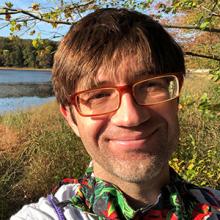James Poskett: Science Has Always Been Global
On this episode of Inside Science Conversations, James Poskett tells host Chris Gorski about his new book, "Horizons: The Global Origins of Modern Science." The book takes readers on a whirlwind trip through history and science, from the precolonial scientific and mathematical insights developed in West Africa, the Middle East and Polynesia to the important discoveries made by people from the Americas and India. The conversation weaves through how Europeans adopted a lot of these ideas, and how those turned into simplified narratives and led to the origins of the idea of the lone scientific genius. James also delves into some of the dark themes of the history of science and why the future of science depends on fully reckoning with its global history.
The show is available on your favorite podcast platforms, including Apple and Spotify. It's also on YouTube.
Here are some excerpts from the interview (full transcript coming soon):
"In a way, I sometimes like to think that Europe was weird, not because it was modern and connected, but Europe was weird because it was especially unmodern and unconnected, and then kind of was at really a middle point of a much longer history from the year maybe 1000 onwards where the world was becoming interconnected. …
"There is this narrative of the lone genius scientist. … Newton, Darwin, earlier Copernicus, Einstein. And that was really a narrative that developed really in the 20th century to try and create this image of the scientist as the rational individual, that fitted very much with the Cold War mindset in the west and the United States in particular, obviously. As you say, this was not the case. Basically, all these individuals, and they acknowledged it at the time, none of the history I tell would have been a surprise to anyone in the early modern period. They were quite happy to acknowledge their debts to earlier thinkers, including those from outside Christian and European cultures. So Copernicus, it's not hidden. He cites five different Islamic authors in "On the revolutions of the heavenly spheres." He was steeped in a culture where people were continually reading and critiquing and developing ideas based off Arabic manuscripts. ...
"I always tell my students, if you hear the term golden age, you should immediately be suspicious, because it has built into it, a decline kind of narrative. So yes, there was an Islamic advance of science, but it didn't suddenly fall off a cliff in the early modern period. And indeed, that narrative served a very specific political goal. It was really invented in the late 18th and early 19th century as European empires expanded into the Islamic world, first in Egypt, also in India, in north India, with the Mughals, later in the Ottoman territories. And it served a quite simple purpose, which was to portray the Islamic world as a once glorious civilization, but one that was now degraded, and needed modern Europe to become civilized and modern again. And so it has this very, like clear, almost propaganda purpose in the 19th century. And what I show in the book is basically that's not true, that Islamic science didn't disappear suddenly in 1400 that it continued to develop and advance and contribute to modern science in a variety of different ways. ...
"I make a claim at the end of the book -- and I really meant it -- that the future of science does depend on understanding its global history. And what I'm what I meant by that was that after the end of the Cold War in the 90s and early [2000s], the broad idea was that we didn't really need to do anything to we didn't really have to get engaged with history anymore, the world would just get better. And that included the world of science, the world of science would get more diverse, it would get more fair. Turns out that wasn't true, right? We're alive today in 2022. And the world didn't get more fair, it didn't become more equal. It didn't become more multicultural, it became more sharply polarized."
Our next episode is scheduled to come out next week. Please like and subscribe to the show on your favorite platform. We hope you enjoy the interviews.
The Inside Science Conversations podcast showcases the human side of science. It's about what makes scientists and researchers tick. We'll cover a wide variety of subjects, from record-breaking running to the hidden history of science. Please, like and subscribe to the show on your favorite podcast platform. Join us as we talk to researchers and authors about their work, their lives and why science is important for everyone.

